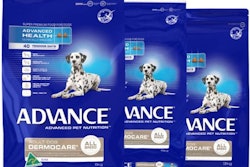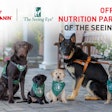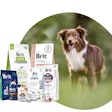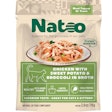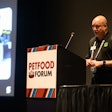
In a survey conducted by Packaged Facts in the United States, pet owners expressed the greatest degree of trust in pet food information from their veterinarians.
“Dog owners turn to vets for food advice nearly as much as for medication, more so for cats,” said David Sprinkle, publisher and research director at Packaged Facts, during his session at Petfood Forum 2018.
In the Packaged Facts survey, 27 percent of respondents strongly agreed with the statement that they trust information provided by their vet about pet food. Similarly, 35 percent agreed with that statement. Only one percent strongly disagreed.
When scientific research backs those vets’ advice, pet owners may be especially receptive to the information, said Sprinkle. By itself, scientific research had a moderate amount of trust from pet owners involved in the survey.
Eighteen percent of respondents strongly agreed with the statement that they trust info backed by scientific research, while 38 percent agreed and 40 percent neither agreed nor disagreed. As with vet’s advice, one percent of respondents strongly disagreed. Research sponsored by pet food companies had a lower degree of trust, though.
The data on pet owner trust was published in Packaged Facts’ “U.S. Pet Market Outlook 2018-2019.”
Sales of pet foods recommended by veterinarians
In Packaged Facts’ survey, 36 percent of dog owners reported buying a brand of dry pet food following a personal recommendation by their veterinarian within the past 12 months. Likewise, 27 percent said they bought a pet treat following a similar recommendation. For cat food, 31 percent bought a specific dry pet food following a veterinarian’s advice.
Considering the importance of veterinary advice to pet owners, it’s no surprise that pet superstores increasingly house veterinary service providers, or that Mars continues buying veterinary services providers, said Sprinkle. For example, Mars Petcare recently acquired the veterinary group Linnaeus, adding it to Mars vet portfolio of VCA, Banfield Pet Hospital, Bluepearl and Pet Partners.
Pet owner trust of information from pet food companies
Both veterinary advice and independent scientific research were more trusted than information directly from a pet food company.
“Consumers have trust issues with pet food companies, most neither agree nor disagree,” said Sprinkle. “In terms of general ‘do you trust?’ the plurality is neither agree nor disagree, which is not what we want.”
Only eight percent of respondents strongly agreed with the statement that they trust information from pet food companies. Five percent strongly disagreed. Fifty-one percent neither agreed nor disagreed.
Convincing pet owners of dog and cat food’s nutrition may drive growth
Convincing dog and cat food buyers of a pet food brand’s nutritional value may provide growth opportunities for those brands, since pet owners seem willing to pay higher prices for healthier pet foods.
Sprinkle singled out nutritional-value promotion as a key area where the pet food industry has room to advance and expand.
“I think we have room for improvement in terms of making our case for our products and providing the objective science to back it,” he said.
Between 2017 and 2018, pet owners consistently replied to Packaged Facts surveys that they were willing to shell out more money for a healthier pet food.





